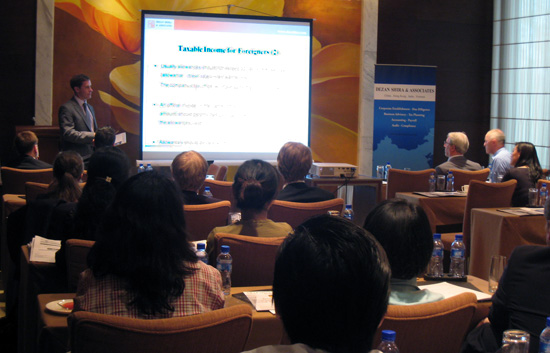Dezan Shira and Partners Hold ‘Major HR Update 2011’ Seminar

By Jon Coates
TIANJIN, May 18 – Dezan Shira & Associates in conjunction with the German Chamber of Commerce in Tianjin and DirectHR organized a “Major HR Update 2011” seminar last Wednesday in Tianjin.
During the seminar, Dezan Shira & Associates Regional Manager Adam Livermore discussed the implications and technicalities of individual income tax (IIT) both for Chinese nationals and expatriates.
Livermore’s presentation, which can be downloaded here, began with the details on how to calculate IIT, followed by the IIT filing requirements, and finally touched on social insurance and housing fund requirements.
Details about taxable income for foreigners and Chinese nationals (including tax rates for given salary brackets) were discussed and the basic calculation of IIT and the main tax-deductible allowances were outlined. For foreigners, this should not exceed 30 percent to 40 percent of gross salary, although the company’s tax officer will have some discretion on such matters.
On top of the usual tax-deductible allowances, Livermore mentioned how to calculate the annual bonus, which allows Chinese nationals and foreigners alike to reduce their tax burden one month out of every year.
Concerning an employee’s severance pay, unless it exceeds 36 times the monthly social salary in the city of employment, there will not be any tax payable on that severance pay.
When it comes to the filing of ITT, foreigners should be aware that although tax filings are made online, the first filing should be made manually. Moreover, the company is responsible for the filing of each employee and deadlines should be respected at the risk of paying a penalty and to avoid having to make a manual filing. Additionally, both Chinese and foreigners are expected to file the RMB120,000 declaration when the circumstances arise.
Last week’s seminar also featured presentations by DirectHR Practice Leader Michael Maeder covering regulations and procedures concerning recruiting technical professionals in China and He Xin from the German Chamber of Commerce and Industry with updates and details on Chinese labor laws.
Foreigners should be aware that laws and regulations concerning tax filing might vary from province to province or even from city to city and are encouraged to seek professional guidance. Dezan Shira & Associates is a boutique professional services firm providing foreign direct investment business advisory, tax, accounting, payroll and due diligence services for multinational clients in China. For advice on taxes in the country please email tax@dezshira.com, visit www.dezshira.com or download the firm’s brochure here.
Related Reading
 Doing Business in China
Doing Business in China
Our 156-page definitive guide to the fastest growing economy in the world, providing a thorough and in-depth analysis of China, its history, key demographics and overviews of the major cities, provinces and autonomous regions highlighting business opportunities and infrastructure in place in each region. A comprehensive guide to investing in China is also included with information on FDI trends, business establishment procedures, economic zone information, and labor and tax considerations.
 The China Tax Guide (Fifth Edition)
The China Tax Guide (Fifth Edition)
This popular book fully updated with all recent tax changes and amendments, details all taxes in China affecting businesses and individuals, how to calculate the amounts due, tax registration and filing procedures, tax minimization techniques, and claiming VAT rebates. It also details good financial management techniques, handling negotiations with the tax bureau and annual audit and compliance procedures.
 Employment Overheads in China’s Welfare System
Employment Overheads in China’s Welfare System
In this issue of China Briefing we look at China’s social security regime and the five social insurance funds that enterprises in China must contribute to: pension, medical insurance, unemployment insurance, maternity insurance, and occupational injury insurance.
 Human Resources in China
Human Resources in China
Specifically designed to cover the most important issues relating to managing a Chinese workforce, this guide details the HR issues that both local managers in China and investors looking to establish a presence on the mainland should be aware about.
Using Stock Options to Attract and Retain Key Employees in China
Getting Your Employees a Hukou – An Unavoidable HR Issue in China
China’s HR Market: How Much Are Your Employees Worth?
China’s Labor Laws Need a Re-Think
- Previous Article Can RRR Raises Really Absorb China’s Excess Liquidity and Inflation?
- Next Article Beijing Announces Wage Bases for 2011 Social Security Payments









